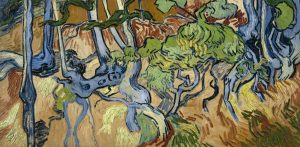The Literature of Sustainability & Resilience
Time & Location
MWF per. 8, Matherly Hall 0117
Office hours (Fall 2023): 4105 Turlington Hall M, 4:15–6:15 PM (F2F and via Zoom), and by appt.

“Dystopia is for losers” – Doug Henwood*
This course takes as its founding premises two unassailable facts. First, we live in a time of increasing environmental instability, mass extinction, food insecurity, forced migration, and social and political unrest fostered by climate change. Second, the human literary, artistic, and ethical imaginations are among our species’ most powerful and adaptive responses to the planetary realities of the twenty-first century and the possibility of a more just, sustainable, and resilient future for all living beings.
We will read widely from an established and emerging canon of literary nonfiction, fiction, memoir, and poetry that addresses the perils and vitality of the late Anthropocene, the geological epoch marked by the influences of humans on the Earth’s planetary ecosystems.
Graded assignments include a short “family carbon biography,” two critical essays on assigned readings and a creative photo-essay project. Extra-credit service learning activities in the course include opportunities to take part in supervised volunteer tree plantings in and around the city of Gainesville.
This course qualifies as a 3-credit Humanities core course for UF’s Bachelor of Arts in Sustainability Studies.
Course syllabus
* From his foreword to Sasha Lilley, et al., Catastrophism: The Apocalyptic Politics of Collapse and Rebirth. PM Press, 2012.